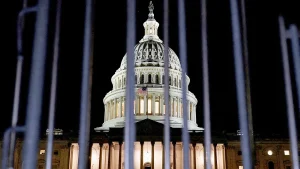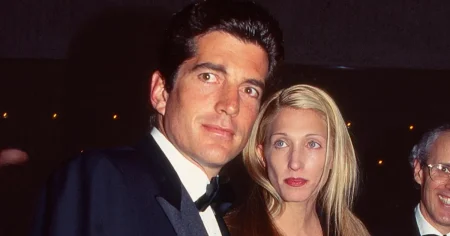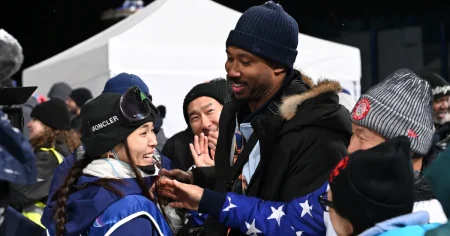Porsha Williams and the Airplane Incident: A Tale of Modern Air Travel Tensions
In the aftermath of BravoCon in Las Vegas, what should have been a routine first-class flight home turned into a public spectacle for Real Housewives of Atlanta star Porsha Williams. The incident, which occurred on Sunday, November 16, highlights the growing tensions that can erupt in the confined spaces of modern air travel, especially when celebrities are involved. As the story unfolded through police bodycam footage released days later, it became clear that what happened aboard that Delta Air Lines flight represented something more universal about human interaction in today’s high-stress travel environment.
According to Williams’ account to police at Hartsfield-Jackson Atlanta International Airport, the trouble began over something seemingly trivial – the volume of Instagram videos she was watching on her phone before takeoff. Her first-class seatmate apparently took issue with the noise, asking, “Am I going to have to listen to that?” Williams responded by suggesting there could have been “a nicer way” to make the request, which allegedly prompted the woman to escalate the situation with profanity, calling Williams a “bitch.” The situation deteriorated further when the other passenger attempted to record the interaction on her phone. Williams adamantly denied physically striking the woman or knocking the phone from her hand, despite the other passenger’s claims to the contrary. The flight crew ultimately intervened by separating the women, moving Williams’ accuser to another seat for the remainder of the flight.
What makes this incident particularly noteworthy is how fellow passengers rallied around Williams, approaching police officers at the airport to provide their eyewitness accounts. One female passenger expressed concern for Williams’ wellbeing, stating, “I was there… The woman got in your face and gave you the middle finger. I’m so sorry. I’m embarrassed.” A male passenger sitting two rows behind the altercation similarly defended Williams, insisting to police that “she did not touch that lady” and that “there was no physical altercation.” According to this passenger, the situation remained at “normal level” verbal commentary until Williams’ seatmate “got really animated and started screaming.” His account suggested that the most physical action Williams took was pointing at the woman while repeatedly saying, “Don’t talk to me like that” – a far cry from the assault alleged by the other passenger.
The other passenger’s version of events, also captured on police bodycam footage, painted a dramatically different picture. She claimed Williams had been watching videos on “full blast” for 25 minutes before she objected, and that after a brief verbal exchange, Williams became physically threatening. “The next thing I know, there was a fingernail so close to my eye that I thought I was going to be physically attacked,” the woman told police. She described Williams as “screaming, calling me crazy, on and on and on,” and claimed she only began recording the incident on her phone to “protect myself” when Williams allegedly slapped the device from her hand. Most dramatically, the woman expressed fear that Williams was “going to have me killed” – a statement that suggests either extreme anxiety or possible exaggeration in the heat of the moment. She also claimed a flight attendant witnessed Williams knock the phone from her hand, describing the action as “assault.”
The incident quickly escalated beyond a simple disagreement between passengers, drawing the attention of federal authorities. The FBI confirmed awareness of the situation the following day, noting that it remained “unknown at this time if federal charges will apply.” This federal involvement highlights the seriousness with which air travel incidents are treated in post-9/11 America, where disruptions aboard aircraft can trigger investigations regardless of celebrity status. The potential legal ramifications of even minor confrontations in the air create an additional layer of tension for all involved, transforming what might be a forgettable argument on the ground into a documented case with possible criminal implications.
Through her attorney Joe Habachy, Williams responded to the situation with a statement that firmly positioned her as the victim rather than the aggressor. The statement characterized the other passenger as “irate and unhinged,” claiming she “verbally assaulted” Williams “without provocation.” Habachy emphasized that the other passenger’s allegations were “in direct conflict with observations from several eyewitnesses,” effectively leveraging the supporting statements from fellow passengers to bolster Williams’ credibility. The statement acknowledged the required federal investigation into incidents occurring aboard aircraft while expressing confidence that Williams would ultimately be vindicated – even suggesting that her accuser might face charges instead. This preemptive legal positioning reveals the high stakes involved when public figures find themselves entangled in such disputes, where reputation management becomes as crucial as the legal outcome itself.
This incident aboard a flight from Las Vegas to Atlanta serves as a microcosm of the tensions that define modern public spaces – where the boundaries between celebrity and privacy blur, where phone recordings can instantly transform private disputes into public spectacles, and where conflicting accounts make objective truth elusive. For Porsha Williams, a reality television star accustomed to having her life documented, the experience represents an unwanted extension of public scrutiny into what should have been private travel time. For her fellow passengers who came to her defense, it represents the choice to become involved in a stranger’s dispute rather than remain passive observers. And for her accuser, regardless of what actually transpired, it represents the complicated reality of interactions with public figures in the age of social media, where allegations can quickly become headline news. As federal authorities continue their investigation, this seemingly minor dispute reminds us all of how quickly tensions can escalate in the pressurized cabin of modern air travel – both literally and figuratively.















